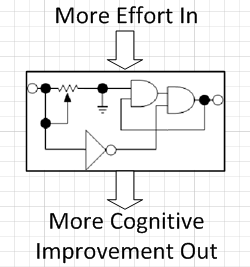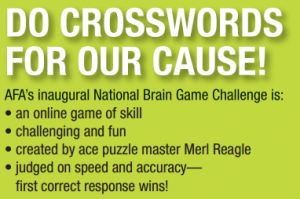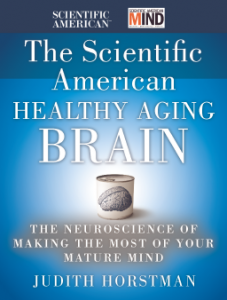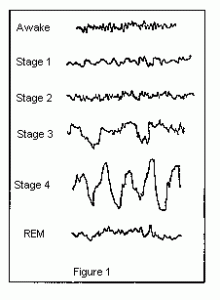Exercise Boosts Brain In Proportion to Effort Made
 We have reported many times in the Next Brain Blog on scientific studies that suggest exercise improves brain function and cognitive performance. Now a new study led by the director of the Montreal Heart Institute suggests that the more exercise you do the more cognitive improvement you see. The study focused on overweight and inactive adults that were 49 years old on average. A summary of the results:
We have reported many times in the Next Brain Blog on scientific studies that suggest exercise improves brain function and cognitive performance. Now a new study led by the director of the Montreal Heart Institute suggests that the more exercise you do the more cognitive improvement you see. The study focused on overweight and inactive adults that were 49 years old on average. A summary of the results:
“After four months of high-intensity interval training, heart patients in Juneau’s study had markedly improved cognitive functions: the ability to think, recall, and make quick decisions. Even more exciting is that the study demonstrated that the more exercise patients could tolerate, the better their results—their minds became “sharper.”
While there is surely some limit to this effect, it does suggest that increasing the duration/intensity of your workout could lead to an increased brain boost.
Categories: Memory and Learning, Older Adult, Problem Solving, Training Tags:
Does Dental Hygiene Impact Brain Health?
 Can brushing your teeth, wearing dentures or otherwise taking care of your teeth and gums protect memory and brain health? One recent study suggests the answer is yes, and the impact can be significant:
Can brushing your teeth, wearing dentures or otherwise taking care of your teeth and gums protect memory and brain health? One recent study suggests the answer is yes, and the impact can be significant:
“It was found that men with inadequate oral hygiene habits who did not wear dentures had a 91% greater risk of dementia than those with adequate oral hygiene habits.”
The key health behaviors are regular brushing and visits to the dentist.
While more research in needed, this is the first study that I have seen that suggests dental health behaviors could be important to building or maintaining or your next brain.
I am interested to hear from readers about other studies. Are there other oral hygiene techniques we should consider as tools for improving brain function or cognitive performance?
Categories: Cognitive Decline, Lifestyle, Memory and Learning, Older Adult Tags:
Multivitamin Improves Memory in Older Men
 That is the conclusion of one study carried out on 51 men ages 50-74.
That is the conclusion of one study carried out on 51 men ages 50-74.
“The results showed multivitamin supplementation, compared to placebo, significantly improved recognition memory performance, although other cognitive function parameters did not differ between the treatment groups.”
The study goes on to suggest it might also help avoid age-related cognitive decline.
I am interest to hear from readers that use multivitamins to improve brain function or cognitive performance.
Categories: Cognitive Decline, Diet, Memory and Learning, Older Adult Tags: vitamins
Using Technology to Supercharge Kid’s Creativity
 Children are naturally creative. Very creative. As parents we want to enhance our kid’s creativity and make sure that it gets carried forward into adulthood. One tool that aspires to do that is the iPad App Toontastic from Launchpad Toys. Kids draw free style and move around a number of characters (e.g. pirates, queens, monkeys) and narrate a story as they play. All the while the App records what they do and compiles it into a cartoon that can be shared online with friends. So far they have 600,000 story tellers from 150 countries that have made more than 2 million cartoons.
Children are naturally creative. Very creative. As parents we want to enhance our kid’s creativity and make sure that it gets carried forward into adulthood. One tool that aspires to do that is the iPad App Toontastic from Launchpad Toys. Kids draw free style and move around a number of characters (e.g. pirates, queens, monkeys) and narrate a story as they play. All the while the App records what they do and compiles it into a cartoon that can be shared online with friends. So far they have 600,000 story tellers from 150 countries that have made more than 2 million cartoons.
While Launchpad Toys does not claim that the App will improve creativity they designed it to do just that. The company argues we are in a creativity crisis by pointing out that creativity scores have been dropping since 1990 (especially in kids 5-12 years old) just when society and the workplace needs innovation the most.
I am interested to hear from readers that are using Apps to improve cognitive performance in kids.
Categories: Child, Problem Solving Tags: creativity
National Brain Game Challenge Begins Today
For a $25 fee/ donation to the Alzheimer’s Foundation of America you can enter the National Brain Game Challenge. This is a chance to test your crossword puzzle solving abilities in an online game. There are two divisions (pro and public) with a $2500 first prize as well as other cash prizes in each division.
donation to the Alzheimer’s Foundation of America you can enter the National Brain Game Challenge. This is a chance to test your crossword puzzle solving abilities in an online game. There are two divisions (pro and public) with a $2500 first prize as well as other cash prizes in each division.
The foundation is sponsoring this contest to promote daily mental exercise as a way to help prevent the disease.
According to the website:
“Research suggests that regular mental activities might help reduce the risk of Alzheimer’s disease or other memory disorders by:
- enhancing cognitive reserve
- stimulating growth of new brain cells, and
- maintaining or strengthening connections between brain cells.”
I am interested to hear from readers that take the challenge or otherwise play crossword puzzles for fun and brain training.
Categories: Cognitive Decline, Other Tags:
Use Clothes to Improve Cognitive Performance
 There are small things we can do with our bodies to improve brain function and cognitive performance in real-time. I have documented many of these techniques on the Cognitive Design blog and you can find them under the tag embodied cognition. Some examples:
There are small things we can do with our bodies to improve brain function and cognitive performance in real-time. I have documented many of these techniques on the Cognitive Design blog and you can find them under the tag embodied cognition. Some examples:
- Holding objects can improve certain types of reasoning and recall
- Walking can improve thinking
- Clenching muscles amplifies will power
- Stepping back from a difficult situation can trigger higher cognitive functions
- Feeling warm or cold primes our emotional judgments about other people
- Swaying back and fourth can improve reflection
- Making hand gestures can improve learning and recall
- Short duration physical breaks (e.g. playing catch) between sessions improves conceptual learning
- Body posture impacts how confident we are about our beliefs and thinking abilities.
So our minds work in part by the way we use our bodies. Now new research indicates that cognitive performance can also be tuned by the clothing we put on our bodies or so-called enclothed cognition. For example:
“If you wear a white coat that you believe belongs to a doctor, your ability to pay attention increases sharply. But if you wear the same white coat believing it belongs to a painter, you will show no such improvement.”
Our cognitive performance improves when we believe we are wearing smart clothes!
I am interested to hear from readers that use clothes that they believe make them smarted. Could be tie, top or outfit you wear to perform well on a test or during an interview. Please describe it and explain why it works.
Categories: Manage Emotions, Memory and Learning, Mental Focus Tags:
Using Neuroscience to Optimize the Mature Mind
 Just finished a good book by Judith Horstman where she explains the neuroscience of making the most of the mature mind. Her findings echo the discussions we have had on the Next Brain Blog. For example, Part three of the book explains in detail how exercise, nutrition, mental stimulation, being social and attitude play a central role in improving cognitive performance as we age.
Just finished a good book by Judith Horstman where she explains the neuroscience of making the most of the mature mind. Her findings echo the discussions we have had on the Next Brain Blog. For example, Part three of the book explains in detail how exercise, nutrition, mental stimulation, being social and attitude play a central role in improving cognitive performance as we age.
She pegs 20-60 years old as the zone of maximum performance for the brain but quickly points out some people peak later in their 70s, 80s and even 90s! She put the central idea of this blog, namely we are responsible for building our next brain, in plain language:
“You built the brain you have today and will continue to refine and remodel it with every action, thought, and feeling and every interaction with people, the experiences, and the environment around you.”
Have you read the book? If so what techniques or insights do think are the most important for building Your Next Brain?
Categories: Books, Cognitive Development, Older Adult Tags:
Good Grades are Mostly Determined by Self-Control
 I am often asked by parents what type of skills are critical for success in school. They hear about special programs or techniques for reading, note taking or math skills and want to know if they work. That is why I am always on the lookout for scientific research that probes how the mind’s of high-performing students work.
I am often asked by parents what type of skills are critical for success in school. They hear about special programs or techniques for reading, note taking or math skills and want to know if they work. That is why I am always on the lookout for scientific research that probes how the mind’s of high-performing students work.
For example, recent research on nearly 700 German eighth graders suggests that a student’s level of self-control is the number one factor that determines success. It is more important than memory, general intelligence, verbal ability, mental speed, numerical ability and even creativity. The researchers claim:
“The data show that the most important factor in getting good school grades was the student’s score on psychological tests of self-control. Cognitive ability was the next best predictor of grades, but in fact, it was not a very strong one.”
While not a surprise to readers of the Next Brain Blog, this is an important finding. Delaying gratification, managing procrastination and the ability to structure and manage time are the capacities that students need for success.
I am interested to hear from readers with insights into how to be an effective student. What learning and testing taking skills are critical and how can we develop them?
Categories: Child, Cognitive Development, College Student, IQ and EQ, Memory and Learning, Training Tags:
New Evidence That Green Tea Boosts Brain Health
 There have been claims over the years that green tea can improve mental alertness and memory. Now a new study reports that a specific chemical in green tea supports the production of brain cells, at least in mice. This could be important for staving off age-related memory decline. More specifically:
There have been claims over the years that green tea can improve mental alertness and memory. Now a new study reports that a specific chemical in green tea supports the production of brain cells, at least in mice. This could be important for staving off age-related memory decline. More specifically:
“We proposed that EGCG can improve cognitive function by impacting the generation of neuron cells, a process known as neurogenesis,” said Bai. “We focused our research on the hippocampus, the part of the brain which processes information from short-term to long-term memory.”
Interested to hear from readers that include green tea in their Next Brain diet.
Categories: Cognitive Decline, Memory and Learning Tags:
Evidence of Learning New Things While Sleeping
 Many of the emails and comments I get have to do with sleep learning. Readers ask if it possible to learn something new while they sleep. So I am always on the lookout for scientific studies that claim we can be taught new concepts or skills while we sleep. Unfortunately, I have not been able to find studies that demonstrate that scientifically, until now.
Many of the emails and comments I get have to do with sleep learning. Readers ask if it possible to learn something new while they sleep. So I am always on the lookout for scientific studies that claim we can be taught new concepts or skills while we sleep. Unfortunately, I have not been able to find studies that demonstrate that scientifically, until now.
Research done at the Weizmann Institute and reported in Nature Neuroscience demonstrates that we are able to learn an association between smells and tones while we sleep. Specially researchers:
“… found that if certain odors are presented after tones during sleep, people will start sniffing when they hear the tones alone – even when no odor is present – both during sleep and, later, when awake. In other words, people can learn new information while they sleep, and this can unconsciously modify their waking behavior.”
So you can learn to sniff in response to a tone while asleep. This does not prove that we can learn more complex and important things while asleep but it does show some new learning is possible. It provides encouragement for personal experimentation with sleep learning. I am interested to hear from readers of the Next Brain Blog that use some form of sleep learning technique. How has it improved your brain function or cognitive performance?
Source of Image: Brain Basics – Understanding Sleep
Categories: Memory and Learning, Music and Audio, Sleep Tags:
